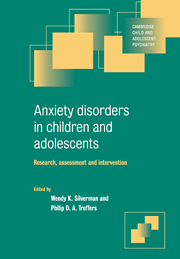Book contents
- Frontmatter
- Contents
- List of contributors
- Preface
- 1 Anxiety and its disorders in children and adolescents before the twentieth century
- 2 Affective and cognitive processes and the development and maintenance of anxiety and its disorders
- 3 Behavioural inhibition and the development of childhood anxiety disorders
- 4 Psychosocial developmental theory in relation to anxiety and its disorders
- 5 Neuropsychiatry of paediatric anxiety disorders
- 6 Clinical phenomenology, classification and assessment of anxiety disorders in children and adolescents
- 7 Friends or foes? Peer influences on anxiety among children and adolescents
- 8 Conditioning models of childhood anxiety
- 9 Traumatic events and post-traumatic stress disorder
- 10 Family and genetic influences: is anxiety ‘all in the family’?
- 11 Child–parent relations: attachment and anxiety disorders
- 12 Community and epidemiological aspects of anxiety disorders in children
- 13 Onset, course, and outcome for anxiety disorders in children
- 14 Psychosocial interventions for anxiety disorders in children: status and future directions
- 15 Pharmacological treatment of paediatric anxiety
- 16 Prevention of anxiety disorders: the case of post-traumatic stress disorder
- Index
1 - Anxiety and its disorders in children and adolescents before the twentieth century
Published online by Cambridge University Press: 25 March 2010
- Frontmatter
- Contents
- List of contributors
- Preface
- 1 Anxiety and its disorders in children and adolescents before the twentieth century
- 2 Affective and cognitive processes and the development and maintenance of anxiety and its disorders
- 3 Behavioural inhibition and the development of childhood anxiety disorders
- 4 Psychosocial developmental theory in relation to anxiety and its disorders
- 5 Neuropsychiatry of paediatric anxiety disorders
- 6 Clinical phenomenology, classification and assessment of anxiety disorders in children and adolescents
- 7 Friends or foes? Peer influences on anxiety among children and adolescents
- 8 Conditioning models of childhood anxiety
- 9 Traumatic events and post-traumatic stress disorder
- 10 Family and genetic influences: is anxiety ‘all in the family’?
- 11 Child–parent relations: attachment and anxiety disorders
- 12 Community and epidemiological aspects of anxiety disorders in children
- 13 Onset, course, and outcome for anxiety disorders in children
- 14 Psychosocial interventions for anxiety disorders in children: status and future directions
- 15 Pharmacological treatment of paediatric anxiety
- 16 Prevention of anxiety disorders: the case of post-traumatic stress disorder
- Index
Summary
Fear is, I think, the greatest mental suffering for children.
George Sand (1854–1855)Introduction
Little Hans and little Albert are so well-known that one might easily get the impression that Freud (1909) and Watson (Watsony & Rayner, 1920) were the first to ‘discover’ anxiety and its disorders in children. This impression is likely to be reinforced by a reading of the contemporary child psychiatry and psychology literatures. These literatures are basically characterized by an absence of any mention about the existence of anxiety and its disorders as phenomena that existed in childhood prior to the year 1900. Klein & Last (1989) are among the few contemporary authors to note that anxiety and its disorders in children were mentioned by others as existing before this time period (they refer to Kraepelin (1883) and Emminghaus (1887) as the first authors to report anxiety states in children and adolescents).
In this first chapter, we present a historical perspective of anxiety and its disorders in childhood and adolescence in terms of how they were viewed in psychiatry and psychology prior to the twentieth century. We chose to focus our attention on this time period because we were more interested in exploring ‘uncharted waters’ than charted waters. That is, as noted, we believe most readers are already generally familiar with the main developments that occurred during the twentieth century (e.g. Little Hans and Little Albert).
- Type
- Chapter
- Information
- Anxiety Disorders in Children and AdolescentsResearch, Assessment and Intervention, pp. 1 - 22Publisher: Cambridge University PressPrint publication year: 2000
- 1
- Cited by

